www.albertocontadornotebook.info - Alberto Contador Fans Notebook

contadorfans@hotmail.com
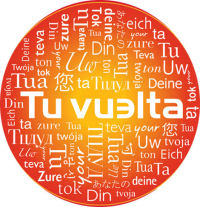
VUELTA A ESPA—A 2008
VUELTA PHOTO GALLERY
VUELTA PRESS ROOM

VISIT THE OFFICIAL WEBSITE
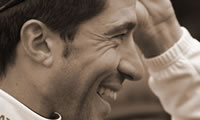
TEAM RUBIERA REPORTS

PODIUM CAFE
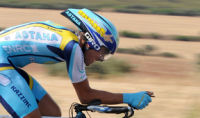
Diego Tuson/AFP/Getty Images

AS.COM: POST-VUELTA INTERVIEW
September 24
ďSharing a team with Armstrong would be difficultĒ
J. Trueba/AS.com
September 23, 2008 - Post-Vuelta tribute day, and Alberto Contador visited us accompanied only by his older brother Fran. The triple champion of the Tour, the Giro, and the Vuelta came without the body guards that usually accompany great sports stars. And Contador is exactly that. Although he doesnít act like it. Heís good-natured, smiling and close, not affected.
With Alfredo RelaŮo in charge, and Mora, Bermejo, Guti, MŪnguez, and Ezquerro, we questioned him about the present and the future.
Be honest. Did Leipheimer work for you or for his own interests?
I can only say that itís not normal that someone who is supposed to work for me ends up less than one minute behind in the general classification. If Navacerrada had been 20 kilometers longer I donít know what the outcome would have beenÖ
Without the bonuses your times would have been tied.
Look, Iím in favour of no bonuses at all, but here there were, and I took advantage of that. In other circumstances I would have planned my ride differently.
But in the Angliru he helped you.
Yes, he did a little but then Valverde pulled out very quickly and left him behind.
And in Fuentes de Invierno?
It was a delicate situation. If I had been alone with Ezequiel I couldíve let him win, but as things stood it was important to get the bonus.
Who is more of a leech (in terms of hanging on to someoneís wheel), Leipheimer or Evans?
HumÖ. To tell the truth, I can't sayÖ.
What kind of feelings do you get from the Vuelta win?
Itís a great tribute. Itís incredible the number of people who encouraged me, from Grenada to La Castellana, where a lot of people from Pinto were present.
Would you be in favor of having the Angliru in the race program every year?
No, bcause I think it would lose its mythical nature. And the Angliru is a special mountain, but all the riders should be able to climb it with the appropriate bracket. There are other climbs which are more difficult, like the Mortirolo, which has a steeper gradient.
When do people suffer more, during a one-hour time trial or one hour of mountain climbing?
One hour of time trialling. Itís so difficult to maintain the aerodynamic position that in the end youíre worn out.
What do you think about during the race?
Sore legs. But you have to surpass yourself. I felt the same at the start of the Aubisque stage in the 2007 Tour. I felt really bad but I decided to attack and did it.
Speaking of the Tour, Patrice Clerc, president of ASO (the company that organizes the Tour) could quit his job. That would leave Christian Prudhomme, the current director, alone. Are you in favor of this change?
No, for me it would be the worst thing that could happen.
Itís been said that Armstrong would be interested in purchasing ASO.
Thatís a bit out of whack. Armstrong is the stuff heroes are made of, but just imagine it! Donít forget that ASO not only organizes the Tour but also other races like the Paris-Dakar car rally. Furthermore, I donít think ASO wants to sell right now.
What do you think of Armstrongís possible comeback?
No problem with me, and I'm waiting for his press conference scheduled for Wednesday September 24 (*or Thursday, September 25), during which heíll outline his plans. Weíll make a decision depending on what he says.
Would you agree to be part of the same team as Armstrong?
It would be rather complicated. I think I have earned the right to be leader of a team, without having to prove anything more. And with Armstrong, difficult situations could arise, like the team would have to work for him and this would be detrimental to me.
Would you quit Astana if they sign Armstrong?
Iíd have to think about it, but in any case I wonít give up my results. My intention right now is to stay with the team because I am under contract until 2010, although Iíve already received many offers from other teams.
What will be Bruyneelís decision in the end?
Bruyneel believes in me because of my results, but you must understand that he got his fame for being linked to Armstrong and nobody can deny this fact.
Could Armstrong win the Tour?
Difficult, but of course not impossible.
Would you like to ride with a Spanish team?
It would be nice, itís enough to see the extraordinary atmosphere of the Vuelta, with such a big crowd encouraging the riders along the road and with a large TV audience which reached peaks of three million spectators during the Angliru stage.
Donít you think there is a sponsor crisis going on?
No, I donít think so, but I am not inside the negotiations, or knocking on the companiesí doors. But itís sure that within the next couple of years Iíd like to form my own team.
Who will your rivals be in the next Tour?
The Schleck brothers. Maybe more Andy. Also Evans, although this year he rode a lot before the Tour and had cracked a bit by the time he arrived. By all means, Sastre, and I think Alejandro (Valverde) will be one, too. I donít discount Leipheimer either, who has experience in disputing grand tours. And Gesink, however, heís still a little green.
And Antůn?
I see Igor Antůn as being more like **El Chava. More of a pure climber.
You cite Valverde, but he demonstrated that maintaining concentration for three weeks is hard to do.
Itís not easy. Sometimes you even get grouchy in the peloton, because if you get confused and start talking about your vacations you can lose position quickly. Iíve got an advantage in that they taught me to ride in front, plus Iíve got the ridersí respect. Ever since I gained notice.
Is it true that you were on vacation when they called you to ride the Giro díItalia?
Absolutely. I was working on my house, I had a dental abcess, and Iíd been off the bike for several days. Then I went to Cadiz to rest and to ride once in a while. That was when Bruyneel called me. I answered him, ďOkay, Iíll do it, but itís in only five days.Ē Then during the race I insisted on not abandoning, and they suggested that I quit the Giro in order to ride the Dauphinť.
How was your experience at the Olympics?
Fantastic, but my goal was the Vuelta. Because of that I couldnít be as supportive in the road race as I wouldíve liked, because I still didnít have the legs. And in the time trial I was hampered by a headwind on the flat portion and a tailwind on the ascent. If it had been the other way around maybe I wouldíve made it to the podium.
Do you count out winning the Worlds next Sunday?
Iím going with the intention of helping my teammates because I want to enjoy the bike, pressure-free. Plus Iím not fast, and as far as earning the medal goes, Iím worthless.
Are you familiar with the city of Astana (the capital of Kazakhstan)?
Iíve never been there, even though they invited me to go on a hunting trip. But they tell me that an incredible number of people in the country follow us. We planned to have the team presentation there, but they say in winter nobody goes out of the house.
*Armstrong has scheduled a press conference for Wednesday, September 24 to outline his cancer initiative. Another press conference is scheduled for Thursday, September 25 to discuss his comeback to professional cycling.
**Nickname of Josť MarŪa Jimťnez Sastre (1971-2003), who won on the Angliru in 1999. Jimenez was Carlos Sastre's brother-in-law.)
Many thanks to Christine Kahane for translation.
A LIFE WITH A MOTTO
ďWhere thereís will, thereís a wayĒ
by Chema Bermejo Ė AS.com
September 22, 2008
Triumph in the Vuelta and the Triple Crown put Alberto Contador at the zenith on the podium in Madrid. The race was a chapter in a lifelong fight against adversity, with a mottoÖ
ďWhere thereís a will, thereís a way, thatís my sonís favorite phrase,Ē says Paqui Velasco, Alberto Contadorís mother.
ďPapa, tell Alberto that he canít come with us. He wonít be able to keep up,Ē said Fran, Albertoís older brother.
Fran thought that his kid brother Alberto, 13, was going to be deadweight in his cicloturista group. Fran had just gotten a brand new bike. Alberto had inherited his, their uncle Raulís old Orbea.
ďDonít worry. You donít have to wait for me,Ē said Alberto. Riding the heavy Orbea, his jacket billowing in the wind, Alberto didnít fall behind. A few days later, on the slopes at Frascuelo, on the way to San MartŪn de la Vega, he rode off and left them.
ďPaco, youíve got to get Alberto onto a team. This kidís not normal,Ē said Emilio, a member of the group, to Paco Contador, the childís father. ďThey invested all their savings in bikes and accessories,Ē Alberto recalls. ďI donít understand why his room was always a disaster when his bike was neat as a pin,Ē his mother complained.
His uncle Abelardo bought him a bicycle, a good one. He christened it in the Trofeo Iberdrola, in Zamora. He fell on his face, broke a tooth, and the bike was destroyed. On the way back to Madrid, Alberto cried. ďIt was because of the bicycle. He didnít complain about the tooth,Ē remembers the director of Velo Club Portillo, the man who signed Pintoís Numero Uno.
ďItís wrong to say it, but my son was a crackerjack in every sportófootball, cross-country runningóbut when he started cycling he wasnít interested in the others anymore,Ē Paco remembers. ďBefore that, he wanted to be a veterinarian.Ē
Alberto loves animals. He gets it from the time he spent in Barcarrota (Badajoz), his parentsí hometown. He spent summers there, a wild thing. ďOne day he jumped out of the car and just ran off. He was still really small. We found him in the barracks of the Guardia Civil with a bag of worms,Ē Fran remembers.
On May 12, 2004, in the Vuelta a Asturias, the cerebral cavernoma manifested itself. A congenital illness. He could have ended up in a wheelchair, like his brother Raķl. Brain surgery. Five months in the care of doctors, barely able to move. Two months later he began to train. In two months more, he returned to competition. And won the queen stage of the Tour Down Under.
Where thereís a will, thereís a way.
PRESS CONFERENCE, STAGE 20
"I'll bust a gut to keep winning"
On Saturday, September 20, Alberto answered questions about his Stage 19 ride, his position as virtual winner of the 2008 Vuelta, and his future at the post-stage press conference.
What did you think when they told you about the margin between you and Leipheimer?
I saw that I didnít feel great and my teammate was very strong. When I saw that winning was going to be difficult I focused my thoughts on the general.
Was there ever a time when you thought you could lose the race?
When youíre suffering you think of everything. My teammate was riding very hard, and if you start thinking about that the triumph can slip away, because any incident can put you over the edge. But when things are difficult, you enjoy them more.
Did you ever dream youíd win all three grand tours in 15 months?
It was beyond imagination. Last year I went to the Tour and won, this year I was told I couldnít go and I went to the Giro on the rebound, and I won. It was great. That was a full season. Then I went to the Vuelta under pressure. I was the favorite and everything centered on me. It was difficult to fathom whatís happened to me.
Youíre becoming a legend, one of five riders who have won all three grand tours, with Anquetil, Hinault, Merckx, and Gimondi, something that will never fade.
It's not much on my mind at the moment, I havenít stopped to think about making history. I canít forget about it because theyíve asked me 40,000 times about it. I donít want to dwell on it, but it is very important.
Which of your three grand tour victories was most fulfilling?
Each of the victories, to a certain extent. The one that really struck me, that gave me the most joy, the one that changed my life was the Tour, but I have great memories of all three. The ones from the Giro are tops. I suffered a lot, but the welcome the tifosi gave me is by far my favorite memory.
The Vuelta has been a tribute, itís been like racing at home, and it's had a following that it hasnít had in years. And with the Vuelta came the privilege of getting a win in all three grand tours.
What differences do you see between the three grand tours?
In the Tour, the tension during the first week is murder, and you also notice the heat, the mileage, and the climbs. In the Giro, it was really cold compared to the Tour and the Vuelta. The climbs are different, with steeper gradients, planned for entertainment value.
In the Vuelta youíre in your own country, at home, where you know everything. You feel more stable, more in the race, and with a more familiar atmosphere.
Is this epoch-making?
Iím not concerned about that. Iíll bust a gut to keep winning, but I donít set goals like that for myself.
What do you want to win now?
After winning the Tour they asked me ďWhat now?Ē I said that I wanted, that I had dreamed about becoming a professional, going to the Tour, and winning it. Iíve won the Tour, the Giro, and the Vuelta, which is to say, the most important ones. I want to keep winning.
Did you have moments of weakness in the Vuelta?
Some days I didnít know how my legs were, compared to my rivals. As the race went on I gained confidence and things went better. In Andorra I had doubts, and in the time trial, but I kept improving.
Now theyíll make if more difficult for you in each competition.
In any race Iíve always tried to be the man to beat, and that will keep happening. Iím not worried about it.
This year you won the Giro and the Vuelta, Carlos Sastre the Tour, and Samuel Sanchez the Olympic gold medal. To what does Spanish cycling owe all these victories?
Spanish cycling is at its best point in history. Any competition we go to, we can win. Itís not due to anything special, some years are like that, although Spain can pride itself on having the best riders in the world.
Have you thought about how youíre going to celebrate this victory?
I havenít thought too much about the celebration. Some friends are expecting me back at the room. Today weíll eat something other than pasta and fish, but tomorrow weíll have a big party.
INTERVIEW AT ZAMORA
ďI came to the Vuelta under a lot of pressure, and if nothing bad happens, Iíll winĒ
by SERGI L”PEZ-EGEA
Zamora, September 18, 2008 - The sun illuminates the Plaza of Viriato in Zamora. Alberto Contador is seated in a terrace, with a horde of fans, ballpoint pens and digital cameras in their hands. He isnít fighting against the Romans, but to make cycling history.
Sunday the Vuelta ends in Madrid, a race that could be awarded to him at 25, just 14 months after winning the Tour and 17 weeks after winning the Giro. Saturday he wants to be brilliant in Navacerrada, because itís his mountain top, and because the roadsides will be swarming with his audience.
But who exactly is his audience? The rider, now given the role of Saviour of Cycling, says, ďThe audience is passionate fans from all over Spain.Ē For that reason, La Vueltaówith more fans on the route and boosted television audiencesóblesses its leader.
Youíre realizing your dreams at an extraordinary speed.
It seems that way, yes. When I decided to start bike racing, I had three dreams: to become a professional, to ride the Tour, and to win it. I reached them right away. So I have to ask myself: Now what?
Circumstances and destiny caused this year to take an unexpected shape. I rode the Giro and won, and now Iím ready to do the same in the Vuelta. If I get the victory, and keep doing well, I will have reached all my goals.
Then, looking ahead to next season, youíll have to prepare yourself mentally to look for new challenges.
I know. In the future, Iíll have to be careful not to lose concentration, because people will always demand that I win the races I decide to ride. Iím glad, because I came to the Vuelta under a lot of pressure. I think Iíve handled it well and, if nothing bad happens, Iíll win.
I can already say that in 2009 there will be only one goal, the 100% highest-priority objective: victory in the Tour. My great future motivation will be to repeat the triumph in Paris. Next year I wonít go to either the Giro or the Vuelta. At my age itís not recommended to dispute more than one grand tour in the same season.
Later Iíll have to be open to other incentives, the next Olympics, and now the World Championships where Iíll give everything so that Valverde, Freire, or Samuel Sanchez, any one of them, becomes the world champion on that Sunday (September 28).
You give the impression that youíll claim the Vuelta title with enormous ease.
The Vuelta hasnít been won yet, but if I compare it to last yearís Tour or to the Giro I have to acknowledge that, of the three races, this one has caused me the least agony. It cost me more to win the Tour and, certainly, the Giro, where I arrived without enough preparation.
Youíre on the verge of being inducted into the society of Anquetil, Gimondi, Merckx, and Hinault, the only ones that have prevailed in the three grand tours. Which one are you most like?
Iím Alberto Contador, and I canít be compared to anybody, and if Iím in form I want to win everything. Merckx is a part of history, from a time when people competed much more than they do now. Gimondi and Anquetil I donít know as well, and Hinault only for organizing podium protocol at the Tour.
History is not the attraction in cycling for me, I donít know enough, although yes, I know that Merckx had a strong character very different from mine. Iím not a person who counts his wins nor who cries himself to sleep at night if he falls in defeat, like what happened to me this year in the Vuelta a Murcia when I lost by five seconds to Valverde. I didnít obsess about it.
Have they told you that Saturday, in the uphill time trial at Navacerrada, passionate fans will be absolutely mad with support for you?
Navacerrada is a very important date for me because I like to win in front of my own people, although I know that there are more followers who support me every time. Already I have fans all over Spain.
Anyway, Navacerrada is special for me, because itís my climb, since I train there almost on a daily basis. Iíll try to win the time trial because I like it, because I want to win the Vuelta, and because I have a teammate, Levi Leipheimer, hot on my heels who has every right to try to win the race. He wonít hold back.
Is Contador the worldís Saviour of Cycling?
Itís a nice thought, but I donít really know. This year theyíve told me that many more people are following the Vuelta live than at other times, and that audiences have increased.
Now, with respect. Is the return of Armstrong to your team a misfortune for your career?
Itís too soon to know. I repeat what Iíve said. Iím going to go to the Tour next year to win, independent of what Armstrong does. If we both go for the maillot jaune, the triumph will be more complicated, but it will put each of us in his place.
UPDATE INTERVIEW
September 15, 2008
ďMy situation is even better than I expectedĒ
Alberto Contador crashed in todayís stage, but it didnít keep him from crossing the finish line with the rest of the race favorites, and he only sustained some bruises and road rash on his left side. He considers it an incident without much importance.
ďI didnít have problems finishing the stage and now Iím just waiting to see how it affects my sleep, that will be the biggest problem.Ē
Contador hit the ground when he put the front wheel of his bicycle into the ditch and lost control.
Youíre in your third week of the race, wearing the leaderís jersey. How do you rate the Vuelta?
I give it a good review, because Iíve gotten to the third week in a privileged situation, and in Asturias, it couldnít have gone better. Itís been a beautiful spectacle, thereíve been a lot of people along the road, the television audiences have increased a lot and the day of the Angliru was impressive.
Asturias has given back to me what it took away on the day of my accident, and it has completely changed the feelings I have for this region.
Is this the scenario you hoped for at this point?
Yes, itís even better than Iíd planned, because my rivals, except for my teammate Leipheimer, are farther behind than I expected.
Is the victory on the Angliru something special for you?
Yes, itís been an important victory and every day that passes Iíll value it more. Winning there is not something everybody can do, and Iím proud of having written my name in that record book.
Does todayís fall confirm that the Vuelta is not won until Madrid?
Yes, cycling is a sport involving many risks, and you canít think youíll win just because youíre ahead. When I say that we wonít know what will happen until Madrid, itís for good reason. Fortunately we managed to salvage todayís stage.
Whatís your strategy for tackling this third and final week?
Right now I feel quite well physically and mentally, and although I know that several days remain and that theyíll all have their problems, Iíll try to ride the four stages before Navacerrada as calmly as possible, controlling the race without exhausting the team, and arrive Saturday in the best shape I possibly can.
What do you expect from the Navacerrada?
Itís still too soon to say, but Navacerrada is a very good climb for me. I know it almost perfectly and I believe I can climb it well. Iím anxious to get there, because itís my regular training ground and that gives me confidence. Also, the last time I climbed it, barely 20 days ago, I think I did a good ascent.
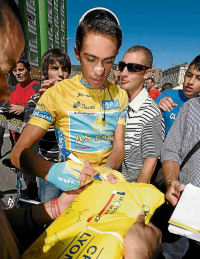
QUESTIONS FOR THE CHAMPION
September 15, 2008
ďYou canít waste these opportunitiesĒ
When Alberto attacked and won yesterday at Fuentes de Invierno--followed by his teammate Leipheimer--Ezequiel Mosquera felt deceived. Mosquera and his team director, Alvaro Pino, thought the Astana boys owed them a win.
Mosquera had fought hard, true, and done the lion's share of pulling the trio up one section of the climb. But Astana took a tough stance, and gave nothing away.
Chema Bermejo of as.com spoke with Alberto today.
El Pistolero de Pinto fired his second bullet at the top of Fuentes de Invierno. The coup de gr‚ce of the Vuelta a EspaŮa. His rivals say itís all over. Heís the strongest and he has the best team to control the race.
After winning on the Angliru, people said that you donít need any more stage wins. Are they trying to confuse you?
No, the Angliru was more than enough. My intention here was not to cede time and, if the occasion came up, to try to take more time. It worked out well, because there were many fans at the finish line and I wanted them to enjoy it.
Pino has criticized you and Leipheimer for taking advantage of Mosqueraís work.
I wasn't sure whether to try for the stage or not. I consulted with the car (and Johan Bruyneel) and they said to go ahead, that I shouldnít pass up the opportunity.
But you understand what Pino was talking about?
I donít know if heís referring to the stage. If heís speaking in general terms, we had already taken enough advantage. It was Ezequiel who was interested in opening a hole in the fight for the podium, so he had to carry the weight of that attack.
Did Mosqueraís performance surprise you?
Not at all. Last year heíd already ridden five Vueltas, and in this one heís clearly been very ambitious all during the race. Heís a fantastic rider. On the climb there were moments when Leipheimer and I were hard pressed to keep pace with him.
All your rivals say the race is decided already. You, too?
I repeat what Iíve already said. In this stage things went very well for me and my situation in the general classification has improved again, but until we cross the last finish line in Madrid, no victory choruses.
Of the remaining stages, which one worries you the most?
All of them. You have to remember what happened to Valverde. We have sections left which are usually quite windy. You can have problems any day if you donít pay attention.
How will you approach this last week?
The time differences that we already have are important, and we must stay cool. Weíll try to plan in every stage to avoid any surprises. Luckily, I have a team thatís used to controlling things. (as.com)
Photo: Alberto autographs a Tour de France jersey in Asturias (Dani Sanchez)
REST DAY 2: INTERVIEW
September 12, 2008
ďIím excited about climbing the AngliruĒ
Alberto Contador did light training today, with a mid-morning session on the rollers instead of going out on the road in rainy weather. The remainder of the day was devoted to rest and recovery, including a good nap. Tomorrow heíll fit his bike with a specially-selected low gear ratio to climb the AnglŪru: 36 x 28.
How do you feel at this point in the Vuelta, especially after yesterdayís effort?
This morning I woke up feeling well recovered, especially compared to my teammates, who were worn out because I was riding on their wheels. To tell the truth, I feel fine.
How do you see the race on the eve of the two key stages in Asturias?
Iím optimistic. I have a really good outlook on the Vuelta, because my power is responding and my rivals are behind in the classification. If I donít have problems, these two stages should go very well, at least, I shouldnít lose time. My rivals will have to prove themselves. Iím looking forward to these two days.
What do you expect from the weather?
They tell me that itíll rain early on and that on the Angliru thereíll be fog. I hope it clears up so that the end of the stage will be brighter, because I do well in wet weather, and I can adapt quite well to that type of weather.
What do you expect to happen on the Angliru climb?
What I expect is time differences among the pure climbers, like Igor Antůn and me, compared to the others who are less explosive. The differences will depend on weather conditions and the rhythm of the race. More than getting big differences, I hope itís a stage with spectacle.
Have you calculated the possible time differences?
No. Iíll be satisfied if I donít lose time, and if I can gain time, even better. But Iím not thinking of a specific amount.
And whatís in store at Fuentes de Invierno?
It depends on what happens on the Angliru, but there could be even more differences, because whoever has a bad dayÖThe stage is shorter and weíll get there with a little more gas, but weíll have to see how it is on the road. Itís probably a better stage for Sastre.
How do you see your rivals? Whoís the most dangerous? Is Valverde still one of them?
Things have gotten very difficult for Valverde, but you canít count anybody out, because extraordinary things can happen in a race. In a normal scenario my rivals now would be Igor Antůn, Sastre, Mosquera, and my teammate Leipheimer, and a surprise or two, like Gesink.
What will be your tactics in Asturias?
To pay attention, keep my cool, think about all the other days still to come and look forward to the chance to prove myself.
Do you want the Angliru?
Yes, Iím excited about it, because itís a mythic mountain in Spain and because I want to do it in competition, no matter what happens.
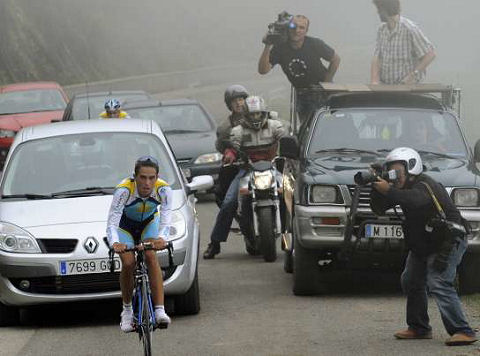
Contador trains on the Agliru, July 17, 2008 (REUTERS)
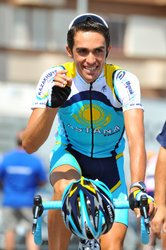
REST DAY: INTERVIEW
September 6, 2008
ďThereís no need to rack our brains over strategyĒ
Alberto Contador had a few minutes yesterday to reflect on his first week at the Vuelta a Espana.
Contador at 25 is a dedicated Tour de France man, and didn't expect to be riding the Vuelta so soon in his career. But Fate landed him in his home tour on August 30, and presented him with the very special opportunity to win all three of cycling's grand tours before his 26th birthday.
On Friday he shared some thoughts about the race, his rivals, and his team, Astana.
How are you on the rest day, and whatís your account of the first part of the race?
Iím fine, and I donít think that physically Iíve gotten beaten up too badly. I hope the past few days have polished my form for the key stages, next. I hope I can play a good role tomorrow.
What do you expect to happen in the Pyrenees?
I think weíll see some of the favorites floundering, and others who are currently overlookable grabbing the spotlight, like Igor Antůn, Cunego, or Gesink. And of course Iíll also have my eye on Alejandro Valverde and Carlos Sastre, and my teammate Leipheimer.
Will there be weakenesses exposed that we didnít see in the TT?
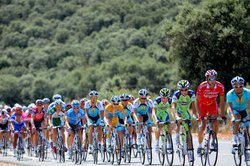 Yes, but the last climb tomorrow is not too hard. Youíd have to be crazy to attack from the beginning because there are so many kilometers, and since the gradient is not very steep, an organized group can make time.
Yes, but the last climb tomorrow is not too hard. Youíd have to be crazy to attack from the beginning because there are so many kilometers, and since the gradient is not very steep, an organized group can make time.
Everything will depend on each personís efforts, and itís a very long stage, so people will get to the end pretty wasted.
How does the rest day affect you?
Okay, like everybody else, I think, but itís also true that one of my traits is quick recovery, so I think it might have suited me if there hadnít been a rest day before the mountains. Anyway, I hope to be very well.
And the second stage in the Pyrenees?
Itíll be totally different. Itís harder, because the Cantů is significant, and then we face the Bonaigua, very long and steep. On the other hand, itís a much shorter stage, finishing at Pla de Beret, which is not as difficult, but comes after so many climbs. Between these two stages weíll see which rider in the general misses out.
What do you think of Valverde?
Alejandroís doing really well; heís well-placed, playing his cards, building up advantages and doing a good time trial. Heís fighting for stage wins and I think heís racked up a lot of points for the GC.
What do you think when he says heís not seeking the general classification?
Thatís a good way to approach the race, but I think heís in it to go all the way, and itíll be different if later heís not well and decides to back off.
Carlos Sastre?
Heís a very experienced rider and I think heís thinking about the long stages, because heís more for the long distances than we are. Heís motivated and he did a good time trial when compared to his direct rivals. Leipheimer got a big advantage on him and heís got to be one of the guys in charge of animating the race.
Whom are you more afraid of?
I wonít name names, in the end itís a little of everything. Itíll be a difficult race, with straightforward marking, but I donít see anybody as more dangerous than anybody else.
Whatís Astanaís strategy?
We havenít talked about it yet, but it will depend on how we feel in the race. We donít need to rack our brains, weíve got an advantage and will race to counterattack. Leipheimer will also use whatever chances he gets, and, to sum it up, weíll ride defensively.
So youíre optimistic?
Yes, of course. If they had told me at the beginning that weíd be in this situation at this point in the race, I wouldíve been very happy. I believe we can take advantage of the situation.
Are you also happy with your team?
Yes, to me theyíre doing really well, very motivated and always cohesive. Thereís an extraordinary atmosphere among us, each guy knows his responsibility and because of this weíre in a great situation.
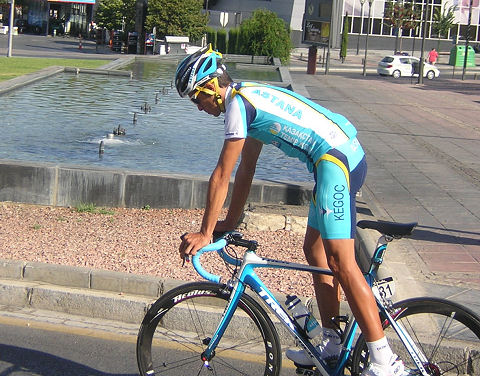
Just training (photo by Christine Kahane)
Upper photos by Olga Fagerstrom (Tim De Waele public gallery)
VUELTA ROSTER FOR TEAM CONTADOR
August 27, 2008
Astana has announced its roster for the Vuelta a EspaŮa, August 30 through September 21.
Riding with Contador will be Levi Leipheimer, Andreas KlŲden, Chechu Rubiera, Benjamin Noval, Sergio Paulinho, Dimitriy Muravyev, Assan Bazayev, and Tomas Vaitkus.
The team arrived in Granada today for the start of the Vuelta on Saturday.
The majority of these riders appeared last Sunday at the ClŠsica a los Puertos, where Astana took the top two podium spots.
A notable absence on Sunday was Alberto's primo escudero Benjamin Noval. Noval missed the race to attend the christening of his godson, Unai Sanchez, the son of Olympic gold medalist Samuel Sanchez. Baby Unai is four months old.
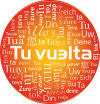
CONTADOR AIMS FOR TRIPLE SLAM
August 20, 2008
Spainís Alberto Contador is looking forward to the Vuelta a EspaŮa, which will run from August 30 to September 21.
His goal is to become one of an exclusive group of cyclists who have won the overall title in all three grand tours.
After winning the 2007 Tour de France and the 2008 Giro d'Italia, Contador aspires to the greatest victory his own country has to offer.
ďIím looking forward to the Vuelta with desire and hope, and the intention to fight for the victory.
Imagine, having the Giro, the Tour, and Vuelta in my palmarŤs at the age of 25. I also really hope I can win
in my own country,Ē Contador told DT Magazine.
Among his chief rivals in the Vuelta will be the winner of the last Tour de France, Carlos Sastre.
Contador doesnít think, however, that the battle for the Vuelta will be reduced to two combattants.
ďI donít think it will be mano a mano between Sastre and me.
Several top riders will fight for the victory, ď he said.
He also praises Sastreís deeds in the Tour. ďI especially like it that the triumph went to someone like him,
who has improved little by little all his life. Itís the crowning achievement of his career,Ē says Contador,
who still asks himself what would have happened if the Tour had not excluded Astana.
ďI would have liked to ride the Tour, for sure. When I saw the mountain stages on TV, I wondered what it would
have been like for me if Iíd been there.
"But Iím not jealous. Itís meant more to me to win the Giro than a second Tour.
And now I have a chance at the Vuelta, besides the Olympics. Itís a better year than it would have been otherwise.Ē (Europa Press)
Web design by Nicky Orr and Modem Operandi. Masthead photo credits: (1) bbc.co.uk (2) Liz Kreutz, kreutzphotography.com.